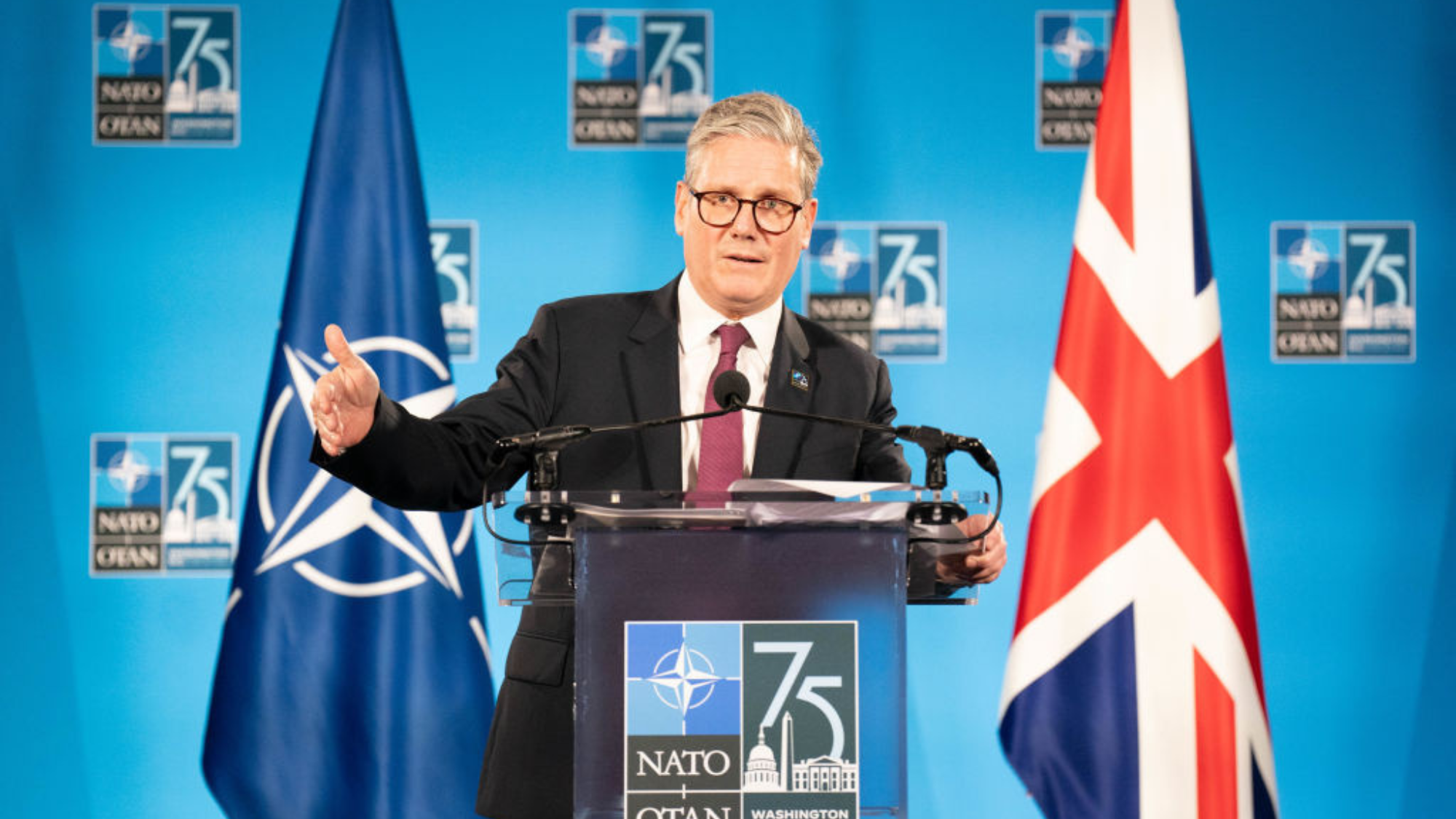British defence: the crisis in the Armed Forces
Depleted military power may not be able to meet its own commitment to up defence spending to 2.5%

A free daily email with the biggest news stories of the day – and the best features from TheWeek.com
You are now subscribed
Your newsletter sign-up was successful
In Keir Starmer's "first appearance on the world stage" as Prime Minister, at the Nato summit in Washington last week, he was keen to proclaim Britain as a "major" military power, said Con Coughlin in The Daily Telegraph.
Starmer declared that security was his "first priority"; reiterated his firm support for Ukraine; and called on all Nato nations to increase their spending on defence from a minimum 2% of GDP, the current commitment, to 2.5%.
"The only problem" with Starmer's otherwise laudable ambitions is that Britain's Armed Forces are currently "small and under-equipped", and that he and his new Defence Secretary, John Healey, seem to have "little idea when, if ever" their own government will actually meet that 2.5% target.
The Week
Escape your echo chamber. Get the facts behind the news, plus analysis from multiple perspectives.

Sign up for The Week's Free Newsletters
From our morning news briefing to a weekly Good News Newsletter, get the best of The Week delivered directly to your inbox.
From our morning news briefing to a weekly Good News Newsletter, get the best of The Week delivered directly to your inbox.
Furthermore, there will be no extra spending in the near future: Labour is insisting that, before decisions are made, there must be a full strategic defence review, a process that could mean no decisions are taken until next year at the earliest.
Dwindling force
In the meantime, it is widely accepted that Britain's Armed Forces are in "crisis", said Larisa Brown in The Times. General Sir Patrick Sanders, the recently retired chief of the general staff, warned that they are so worn down that they could not defend the country if the worst happened, or even fight "a small war" abroad for more than a month.
UK forces lack essentials, from supply trucks to electronic warfare systems. The RAF and the Royal Navy have overspent on planes and ships, so the Army has had to cut back. It is now less than 73,000 strong, its smallest size since the Napoleonic era, and it is "considered deficient" in important areas such as artillery and air defence.
Earlier this year, the MPs' Public Accounts Committee warned that the gap between the Ministry of Defence (MoD) budget and the cost of meeting the UK's desired military capabilities has grown to at least £16.9bn, its largest-ever deficit.
A free daily email with the biggest news stories of the day – and the best features from TheWeek.com
'Reset' required
Still, demanding that the new Government raise spending "within days of taking office" is wrong and "pointless", said The Guardian. Budgets are limited. Providers of all essential public services are "lobbying the Government with the strongest cases they can muster".
And the strategic defence review is badly needed, said Edward Stringer in The Daily Telegraph. The MoD is in "a downward spiral of paying more to get less". The Ukraine War has been a wake-up call. Our "bonsai" peacetime forces, based on small amounts of top-of-the-range military equipment, would be hopeless in a sustained conflict. We need to build up supplies of artillery shells and other munitions, and to adapt to drone warfare.
If we want a military that "our allies and foes will respect", a "fundamental reset" is needed.
-
 Local elections 2026: where are they and who is expected to win?
Local elections 2026: where are they and who is expected to win?The Explainer Labour is braced for heavy losses and U-turn on postponing some council elections hasn’t helped the party’s prospects
-
 6 of the world’s most accessible destinations
6 of the world’s most accessible destinationsThe Week Recommends Experience all of Berlin, Singapore and Sydney
-
 How the FCC’s ‘equal time’ rule works
How the FCC’s ‘equal time’ rule worksIn the Spotlight The law is at the heart of the Colbert-CBS conflict
-
 Munich Security Conference: a showdown between Europe and Trump?
Munich Security Conference: a showdown between Europe and Trump?Today’s Big Question Report suggests European leaders believe they can no longer rely on the US for military support – but decoupling is easier said than done
-
 What is ‘Arctic Sentry’ and will it deter Russia and China?
What is ‘Arctic Sentry’ and will it deter Russia and China?Today’s Big Question Nato considers joint operation and intelligence sharing in Arctic region, in face of Trump’s threats to seize Greenland for ‘protection’
-
 What would a UK deployment to Ukraine look like?
What would a UK deployment to Ukraine look like?Today's Big Question Security agreement commits British and French forces in event of ceasefire
-
 Would Europe defend Greenland from US aggression?
Would Europe defend Greenland from US aggression?Today’s Big Question ‘Mildness’ of EU pushback against Trump provocation ‘illustrates the bind Europe finds itself in’
-
 Did Trump just end the US-Europe alliance?
Did Trump just end the US-Europe alliance?Today's Big Question New US national security policy drops ‘grenade’ on Europe and should serve as ‘the mother of all wake-up calls’
-
 Is conscription the answer to Europe’s security woes?
Is conscription the answer to Europe’s security woes?Today's Big Question How best to boost troop numbers to deal with Russian threat is ‘prompting fierce and soul-searching debates’
-
 The Baltic ‘bog belt’ plan to protect Europe from Russia
The Baltic ‘bog belt’ plan to protect Europe from RussiaUnder the Radar Reviving lost wetland on Nato’s eastern flank would fuse ‘two European priorities that increasingly compete for attention and funding: defence and climate’
-
 How should Nato respond to Putin’s incursions?
How should Nato respond to Putin’s incursions?Today’s big question Russia has breached Nato airspace regularly this month, and nations are primed to respond